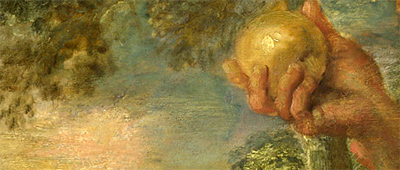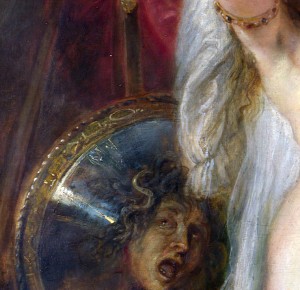Featured Story • July 2013

Detail from Peter Paul Rubens' "The Judgement of Paris" ca 1636
The Wives of Paris
Marie Brennan
They offered him a beautiful woman, power over men, victory in war.
So of course he chose the beautiful woman. He was a young man, after all. Power would come—don’t forget, he was the son of a king—and victory was guaranteed, because all young men are invincible … but a woman’s soft thighs are another matter. To a teenager, that is the fruit of Tantalus: only divine intervention can bring it within reach.
Aphrodite cleared up his acne, taught him how to flirt, and sent him off to Sparta. And the rest is well-known myth.
* * *
Never mind Oenone. (No one ever does.) Menelaus, sure, people remember him; how many guys start a war over a simple case of adultery? Nobody remembers the nymph Paris abandoned. Even though she did the Morgan le Fay thing, and sent her son—Paris’ son—to try and betray Troy to the Greeks. Even though she did the Hallgerðr thing, and refused Paris the assistance that might have saved his life. Even though she did the thing done by women in tales the world over, and committed suicide after he was dead.
Oenone, Οίνώνη, nymph of wine. Maybe she was drunk when she met Paris. She wouldn’t be the first woman to make that mistake, seeing a young man, knowing he’s going to break her heart, and giving it to him anyway. Sure, she had more than just instinct to warn her; she had prophecy. But who ever pays attention to that?
* * *
Say Paris was different. Still seventeen years old, still exiled from Troy to herd sheep on Mount Ida, but with more on his mind than just sex. After all, he’s married to a nymph, and we all know what they’re like, the little tarts. He’s already getting enough action.
A beautiful woman, power over men, victory in war. He’s never seen war, but power sounds nice. More interesting than this hillside, anyway. Especially when Hera dangles the extra incentive of gold, jewels, riches beyond his (rather limited) imagination. Oenone never seems to care that she’s married beneath herself, that he’s a sheepherder and she’s an immortal nymph, but it bugs him.
So he tells Aphrodite her ass is too fat for his taste, and hands the golden apple to Hera. Hey presto, power.
It takes a little longer than that, of course. She isn’t a genie, to conjure up a kingdom for Paris out of thin air, and bumping off his dad (not to mention his forty-nine brothers) to make him King of Troy seems rather in poor taste. But marriage, that’s a respectable road to both power and riches.
Enter Lamia. (Hera can see the future, too. Leave any woman unattended for long enough, and Zeus will try to sleep with her; it seems kinder to make sure Lamia is attended than to get vengeance later by making her eat her own children.) She’s a queen of Libya, and as she hasn’t yet ripped out her own eyes over the kids-for-dinner thing, she’s passably pretty. No Helen, but then again who is, and since Paris has never laid eyes on Helen, it doesn’t much matter. This is a political match anyway, made for the purpose of world domination.
She’s always wanted to take over Egypt. Not with an army; armies are unsubtle things, and Lamia has a serpent’s subtlety. Instead she and her new husband offer a trade-pact here, a treaty there, a marriage of some Egyptian daughter to a Libyan son. (Paris acknowledges the boy as his own, and that’s enough for political purposes, even though the kid’s skin is black as coal.) Pretty soon various Greek cities are client-states to the North African empire. Their caravans and ships venture from the Pillars of Hercules to the far reaches of the East, bringing back spices and emeralds and letters of friendship from foreign potentates.
Nobody besieges the gates of Troy. Why should they? It’s a backwater, a forgotten little city, neglected by the great power that now rules half the known world and has alliances with the other half. Paris hasn’t forgotten that his father dumped him on Mount Ida to herd sheep. Old Priam lives long enough to see his kingdom wither, starved for trade, its young people migrating to greener pastures. Twenty-three of Paris’ brothers end up working for the Libyan court, in one minor clerical position or another. Not Hector, of course; it’s beneath a crown prince’s dignity. He puts together a force of warriors instead, intending to attack whatever target presents itself. They never make it out the door: Priam keels over of a very convenient heart attack, so everything stops for the funeral games, and while that’s going on Hector discovers Troy’s in debt up to its eyeballs. Faced with a choice between selling himself in marriage to some foreign princess, and watching what remains of his kingdom be carved up among its neighbors, he falls on his sword.
Paris never hears about any of this. Lamia sees to it that his flunkies don’t trouble him with such insignificant trifles.
Oenone’s heart is broken, of course. Paris didn’t abandon her on Mount Ida; he and Lamia agreed from the start that there’s no reason to expect marital fidelity, so long as there are enough acknowledged children to marry off for alliances. But Oenone pines for their days of bucolic peace; at this remove, it’s easy to forget the annoyance and toil that caring for sheep actually requires. She preferred the sheepherder to the king, anyway. She feels like she doesn’t even know Paris anymore.
She goes to tell him this, and he stares blankly at her, like she’s speaking—well, not Greek. Russian, maybe. Weeping, Oenone asks if he knows her anymore.
A flunky, ushering the devastated nymph out the door, explains that they don’t trouble the king with such insignificant trifles as her name.
* * *
So power corrupts—but we knew that already. And thinking with the downstairs brain never ends well. What’s behind door number three?
Up the aggression a bit, and you’ve got a Paris who dreams of glory on the battlefield. The daughter of Zeus is more cunning than her sisters, or whatever you call the wife of the guy whose head you sprang out of, and the chick born from the sea foam created by the genitals of a dead ur-god. (No doubt the Germans can build nouns for these things.) She doesn’t dangle breasts or gold. She merely looks at him, and looks at him, until he squirms and reddens and decides he’s got to prove something to the grey-eyed bitch. Victory in war, please, and you other two can shove off.
Athena makes him earn it—which means he has to learn something other than sheep—which means he needs a teacher. All the fashionable heroes go to Chiron, but she’s bored with the centaur’s style, and decides to try something new. She sends him to Penthesilea.
The Queen of the Amazons gives Paris plenty of reason to regret his choice. Her followers are less than pleased with having to train a man; they threaten to cut off his balls several times a week. (The threats are that often, not the cutting. Unlike Prometheus’ liver, his balls would not grow back.) And the training itself is boot camp from hell, for a fellow whose most vigorous exercise until now has been sporting with a nymph. But Penthesilea is nothing if not determined, and after a while they both start to enjoy it, the discipline and the shouting matches and eventually the sex, which is nothing like it was with gentle Oenone.
Hercules. Theseus. Achilles. … and Paris. Menelaus wouldn’t be able to kick this kid’s ass, not once Penthesilea is done with him. The Amazons abandon her, muttering in disgust about that prick corrupting their queen, but the two of them hardly care; together Paris and his warrior-wife rampage around the Mediterranean, collecting an army of rabid followers and laying waste every kingdom and city-state you care to name, before returning to Troy in triumph. There Paris “suggests” to his aged father and forty-nine brothers that maybe it’s time for a fresh rump on the throne. They’re smart enough not to argue.
And when the debts of his rampage come due, nobody breaks a sweat. So what if every kingdom and city-state in the Mediterranean wants a piece of Troy’s hide? Their king’s got Athena on his side. She won’t let him lose.
Not in war, anyway. But she promised him victory, not wisdom, and nobody planned for Oenone. Nor for the Amazons, who haven’t forgotten that their queen waltzed off with some dick-swinging jerk. Jilted nymph plus psychotic warriors equals a plan that, while not as iconic as a giant wooden horse with Greeks inside, gets the job done.
One hundred harlots enter the city of Troy. Ninety-nine disperse through the soldiers’ quarters, gritting their teeth into something like a smile. The hundredth makes her way up to the palace, where she pours poisoned wine down the throats of her erstwhile husband and the tramp he ran off with.
It doesn’t take ten years. It doesn’t even take ten hours. Half the soldiery is dead by morning, and the gates are jammed open; every Trojan with common sense grabs their portable wealth and flees. What’s left descends into chaos and looting, and when the armies finally show up, they burn what little remains.
* * *
Stop me if you’ve heard this one before. There’s a kid, and you just know he’s going to be trouble, so you decide to prevent it by offing him. Only you’re too squeamish to actually do the deed, so instead you handle it in a roundabout way—abandoning him on a mountainside, say, where you can be deceived about the attempt’s success.
It didn’t work for the parents of Oedipus; it didn’t work for the uncle of Romulus and Remus—hell, it didn’t work for Snow White’s step-mother—but why mess with tradition? Off to the mountainside with little baby Paris. As proof of his death, the herdsman presents a dog’s tongue. And Priam and Hecuba sleep soundly, knowing they sent their son off to be murdered … but at least he won’t be the ruin of his homeland, as the prophets had foretold.
Except he will, of course, because Fate’s a bitch—three of them—and mountainsides never work like they’re supposed to. You can’t blame Helen: her face may have launched a thousand ships, but Paris is the one who brought them to Troy. He was always going to bring destruction. Athena and Hera couldn’t change that. No woman, mortal or divine, could.
Nor even poor, forgotten Oenone. Paris’ first wife, who knew he was going to break her heart, and gave it to him anyway. Get rid of the golden, discord-causing apple; get rid of the three goddesses who have nothing better to do with their time than squabble about who’s the prettiest. Leave him there on Mount Ida, a simple shepherd with his nymphly wife.
He’ll still find a way to bring it down.
But maybe there’s happiness in that simplicity, before it falls apart. No politics; no bloodshed; no marriages broken by an adulterous spouse.
And no epic poetry, spanning the gulf of ages, singing of glorious tragedy.
Oenone would not complain.
 Marie Brennan is the author of the Onyx Court series of London-based historical faerie fantasies: Midnight Never Come, In Ashes Lie, A Star Shall Fall, and With Fate Conspire, and the urban fantasy Lies and Prophecy. Her most recent novel, the adventure fantasy A Natural History of Dragons, came out in February 2013 from Tor Books. She has published more than forty short stories in venues such as On Spec and Beneath Ceaseless Skies.
Marie Brennan is the author of the Onyx Court series of London-based historical faerie fantasies: Midnight Never Come, In Ashes Lie, A Star Shall Fall, and With Fate Conspire, and the urban fantasy Lies and Prophecy. Her most recent novel, the adventure fantasy A Natural History of Dragons, came out in February 2013 from Tor Books. She has published more than forty short stories in venues such as On Spec and Beneath Ceaseless Skies.
Here’s how she describes the origin of “The Wives of Paris”: “A member of my crit group was telling us about an awesome Trojan War story she was working on—a creepy tale about Schliemann’s excavation of Troy in the 1870s, with Cassandra as a ghost and all manner of other nifty details. Halfway through her describing it to us, my brain said, huh. I wonder what would have happened had Paris given the apple to Hera or Athena? A whole host of details suggested themselves very rapidly thereafter: Oenone, the prophecy, and so on. I had great plans for this story. It would be this rich, mythic tapestry; I was going to write it in beautifully poetic language.
“Then I started typing, and out came the snark.
“Oh well….”
![]()
If you’ve enjoyed what you’ve read, please consider pitching in to keep us going. Your donation goes toward future content.
![]()
















